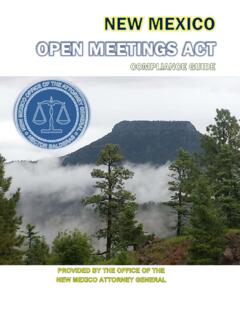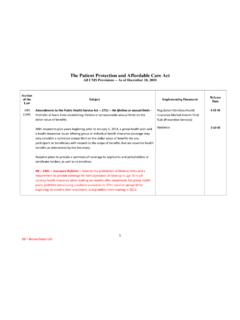Transcription of Plagiarism, Academic Integrity and the Law - ed
1 Douglas & Watt Volume 13, Issue 2 (2019) e-JBEST , (2019) 73 e-Journal of Business Education & Scholarship of Teaching Vol. 13, No. 2, September 2019, pp: 73-79. Plagiarism, Academic Integrity and the Law Susan Douglas USC School of Law University of the sunshine Coast, Australia Email: Gregory Watt USC School of Law University of the sunshine Coast, Australia Abstract The purpose of this paper is to examine the issues of plagiarism and Academic Integrity as they are covered by universities and to then identify the existence of legislation that would impose legal consequences. Accordingly, this paper adopts a legal approach to critical analysis and discourse in the examination of the issues and the appropriate legislation. Key words: Plagiarism; Academic misconduct; Copyright Act 1968 (Cth); Crime and Corruption Act 2001 (Qld); Criminal Code 1899. JEL Classification: M41 PsycINFO Classification: 3550 FoR Code: 1303; 1503 ERA Journal ID#: 35696 Douglas & Watt Volume 13, Issue 2 (2019) e-JBEST , (2019) 74 Introduction Student Academic Misconduct and Plagiarism Universities typically define various Academic Misconduct in very similar terms and for the purpose of this paper the examples are derived from the University of Queensland (2019).
2 His choice is not intended to be a reflection on the Integrity of UQ but rather to act as a point of reference for the discussion to follow. Academic Integrity - is the moral code or ethical policy of academia. This includes values such as avoidance of cheating or plagiarism; maintenance of Academic standards; honesty and rigor in research and Academic publishing. (UQ, 2019, ) plagiarism - the act of misrepresenting as one's own original work the ideas, interpretations, words or creative works of another either intentionally or unintentionally. These include published and unpublished documents, designs, music, sounds, images, photographs, computer codes and ideas gained through working in a group. These ideas, interpretations, words or works may be found in print and/or electronic media. (UQ, 2019, ) Academic Misconduct is much more broadly defined to include plagiarism, misappropriation of university property, tampering in examinations, impersonation of another student and forgery for example.
3 (UQ, 2019, ) However, each university has its own view on what amounts to plagiarism and how to deal with it. Courts of record are seldom concerned with plagiarism per se. The Supreme Court of Queensland was asked to consider the issue in a 2007 case (Humzy-Hancock, Re [2007] QSC 34). In this case, the applicant, Mr Humzy-Hancock, disclosed in an application for admission as a legal practitioner, that he had been disciplined by Griffith University Law School for Academic misconduct in the form of plagiarism. His Honour McMurdo J, after examining the specifics of the case found that plagiarism was not established. He found that intention to deceive is a vital element in allegations of plagiarism (14) and that in the case, ..his (Mr Humzy-Hancock) work demonstrates an inattention to detail in other respects, suggesting that in the respects complained of, it was carelessness which was the cause of the lack of attribution. (38). Referencing errors, negligence and lack of technical knowledge do not amount to plagiarism.
4 This was the result of poor work, not plagiarism. (41). Academic Misconduct, Plagiarism, Cheating and the Criminal Law While the above case concerned a character analysis pursuant to professional licensing requirements, plagiarism or more broadly cheating could be a breach of both Civil and Criminal Law. A range of remedies are available to the copyright owner including injunction, damages and account of profits which are set out in the Copyright Act 1968 (Cth) Part V. It is also possible that the Tort of Passing Off or the Australian Consumer Law (Section 18) may be breached. However, the focus of this paper is the application of the crime of Fraud, which applies on a state by state basis regardless of whether the published material is subject to copyright or is uncopyrightable. For convenience, this paper deals with the Queensland jurisdiction, although there are similarities with other states. In Queensland, the relevant legislation is the Queensland Criminal Code (1899).
5 Section 408C provides in part: (1) A person who dishonestly .. (e) gains a benefit or advantage, pecuniary or otherwise, for any person; or (f) causes a detriment, pecuniary or otherwise, to any person .. commits the crime of fraud. Douglas & Watt Volume 13, Issue 2 (2019) e-JBEST , (2019) 75 (2) An offender guilty of the crime of fraud is liable to imprisonment for 5 Taking the operative elements in turn: Dishonesty In R v Dillon [2016] 1 Qd R 56, the Queensland Court of Appeal held that dishonestly in s 408C has its ordinary meaning and required the prosecution to prove, beyond reasonable doubt, that the accused person was dishonest in his or her actions, by the standards of ordinary honest people. This means that the objective rather than the subjective standard applied. It is not therefore necessary for the Crown to prove personal knowledge of guilt by the accused. A person may act dishonestly even if they do so innocently. Note the distinction with the earlier case Humzy-Hancock, Re (which was not itself concerned with s408C specifically, or indeed, crime generally) Benefit or advantage The word benefit is defined in s 1 of the Code as follows: benefit includes property, advantage, service, entertainment, the use of all access to property or facilities, and anything of benefit to a person whether or not it has any inherent or tangible value, purpose or attribute.
6 In Moylan v State of Western Australia (2007) 169 A Crim R 302, the Western Australian Court of Appeal held that simply achieving the prospect of applying for a position of chief executive officer, without any guarantee of obtaining the position, was a benefit, pecuniary or otherwise . The court deliberated that a benefit was gained because the appellant was placed in a superior position because of the resignation of the former chief executive officer. The Queensland Court of Appeal adopted this reasoning in R v Saba [2013] QCA 275 and explained that such a benefit was tangible and real. The Justices also adopted the following definition: The Shorter Oxford English Dictionary (1993) relevantly defines benefit as .. 4 gen (An) advantage or gift . The Macquarie Dictionary (revised ed, 1985) relevantly defines benefit as .. 2 anything that is for the good of the person or thing .. 6 to gain advantage; make improvement. These tests would need to be applied to any specific instances of potential plagiarism.
7 The paper under examination would need to be objectively dishonest rather merely carelessly written without appropriate attribution. This would a matter of fact and may be easier to prove with a high percentage of copying. The attempt to obtain a better grade would appear to fit the very broad nature of gaining a benefit in all cases. Recent Developments The Commonwealth has recently released an exposure draft Bill for comment, the Tertiary Education Quality and Standards Agency Amendment (Prohibiting Academic Cheating Services) Bill 2019. The Australian Government has called for comments and, indeed, many Universities has responded. Moreover, some Universities may have used the opportunity to examine their policies on plagiarism more generally. Comment closed on 28 June 2019. It is important to note, at the outset, that because to the Constitutional arrangements between the Federal Government and the States, this Bill has some structural limitations.
8 Any Commonwealth legislation must be tied to a constitutional Douglas & Watt Volume 13, Issue 2 (2019) e-JBEST , (2019) 76 head of power. In this case, the law applies, under the Australian Constitution 1901, to Interstate Commerce (s 51 (i)); the use of post or telegraph (s 51 (v)); conduct by Aliens (s 51 (xix)); by Corporations (s 51 (xx)); conduct occurring in Commonwealth places or territories or outside of Australia. These limitations would perhaps not be too significant in practice, given that electronic communication is ubiquitous. The Bill introduces severe Criminal and Civil penalties against persons to advertise or provide cheating services and injunctive powers for Internet providers, with the Tertiary Education Quality and Standards Agency (TEQSA) as the enforcement regulator. The proposed new s 114A of the Tertiary Education Quality and Standards Agency Act 2011(TEQSA Act) provides for maximum criminal penalties of two years imprisonment or 500 penalty units (currently $105,000) (ss (1) and civil penalties of 1,000 penalty units (currently $210,000) (ss (2)) for contravention of the relevant services mentioned in subsection (3).)
9 These relevant services include: (a) completing an assignment or any other work that the student is required to complete as part of the course of study; (b) providing any part of a piece of work or assignment that the student is required to complete as part of the course of study; (c) providing the answers for an examination that the student is required to complete as part of the course of study; (d) sitting an examination that the student is required to complete as part of the course of study. Section 114B of the TEQSA Act offers identical penalties for advertising relevant services. The Department of Education and Training has published a list of responders and a summary of comments received, which included support for penalties against commercial contract cheating, the need for considering cheating as important, increasing TEQSA s role, improving detection processes and educating staff and students. ( ) Summary In all cases, but particularly those involving electronic submission, the student should be able to view the detailed online plagiarism report prior to submission in order that they may have an opportunity to amend and correct any potential suspect wording.
10 Naturally, if the copied portions refer to another student, their identity should remain confidential. When a student uploads an assignment for submission and submits it, it should be returned immediately with a copy of the report, so that it may then be resubmitted with an appropriately recorded acknowledgement of understanding and with full knowledge of the offending sections. It would be difficult for such a student to claim negligence or carelessness or mistaken conduct, particularly if the student acknowledges having read the report. Douglas & Watt Volume 13, Issue 2 (2019) e-JBEST , (2019) 77 Responsibility of a University Universities in Queensland are corporations created under state Acts. For example, University of Queensland Act 1998, James Cook University Act 1997, Queensland University of Technology Act 1998, Central Queensland University Act 1998, Griffith University Act 1998, University of Southern Queensland Act 1998, University of the sunshine Coast Act 1998.














